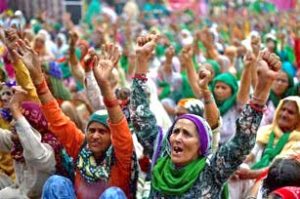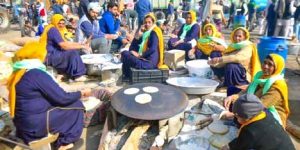Communist philosophy and Revolutionary Change here ♦ Support and Build Communist Work Internationally here ♦

Farmworkers’ protest, International Working Women’s Day
India: Communist Philosophy and Revolutionary Change
DELHI (INDIA) March 8—“As farm workers we plant seeds. We see how these small seeds grow into mature plants. When harvest time comes, we see the small seeds that we planted produce plants that produce thousands more seeds. How can small seeds produce thousand and millions more seeds?
“The seed changed into a mature plant because it got the correct amount of water, sunlight, and fertilizer. But you can plant a stone and give it water, sunlight, and fertilizer, and it won’t produce another stone. It is something inside the seed. When put in the correct environment, the seed develops roots and leaves. It is not a seed anymore.
“This is how revolution develops. We are like seeds. When we are confronted by the bosses, we no longer are small seeds. We turn into a working class, and when we unite in large numbers, we have the potential to destroy them and form a new society.”
The above is from a group of about 25 young farm workers meeting with six ICWP comrades to discuss the communist philosophy of change. Since December, meetings like these have taken place every day. These comrades all talk with many people who get inspired and who are connected with many others. Through these connections, discussions about the need to organize for communist revolution reach thousands of people.
Small Numbers of Communist Seeds can Sprout into Millions
A small group of ICWP members joined the Delhi rebellion in December. We already had the experience of organizing among hundreds of thousands of migrant workers during the pandemic. Before that, we were active with the students and others who were rebelling against vicious police attacks on Muslim workers.
So when the farmers started marching to Delhi in December, we joined them. Our outlook was to recruit masses for the communist revolution. We are the seeds of revolution.
Today we are still with over 300,000 farmers, farmworkers, and some industrial workers camping on the outskirts of Delhi. They have brought tractors, trolleys [trailers] and lots of people. Young women, men, and children have turned Delhi into a battle zone against the police and their weapons.
Our day-in and day-out activities are all about communist change.
We wake up very early in the morning. It is extremely cold. We have to organize hot water by burning wood into charcoal. We have only half a bucket of water to bathe. There are 300,000 of us.
How will communist power provide hot water to everyone? Now, we are living under the restrictions of the bosses. In a communist society, houses and workplaces will be organized collectively. This will give everyone things to do. We see this every day in our encampment in Delhi. Each person contributes something for everybody – whether getting wood to convert into coal (charcoal), tending the coals or bringing sacks of vegetables to cook.
Langar Inspires and Expands our Vision of Communism
As the day progresses, we begin to think about preparing breakfast again for 300,000 people! Older comrades, both women and men, are very skillful in organizing continuous groups that bring the tea, flour, oil, vegetables, etc. This collective effort is called Langar, where everyone is involved in cooking and preparing food and cleaning dishes. No money changes hands.
Communist society will provide food on a much larger scale. Delhi gives us a vision of the future. Unrestricted by money, rent, and loans backed by a fascist police state, the masses will unleash their imagination and creativity to collectively produce food and everything we need.
We will learn the nutritional aspects of food and exercise and the benefits of entertainment like singing and dancing. Cooking, cleaning, and taking care of each other will be a joyful activity unlike the dreadful experience of capitalism’s wage slavery.
As the day progresses, our communist tasks continue.
There are millions of people around us talking about everything – from their family problems to the looming crisis in the farms to political parties. The farmers have created their own newspaper Trolley Times. We reproduce some Red Flag pages in Punjabi, the language spoken by most people here. We insert copies of our literature into Trolley Times to avoid detection by the undercover police agents when we are with the masses.
Our distribution of these pages takes about two hours. Dozens of comrades are involved. It is like a small city with over 300,000 people. Soon it is going to be time to cook and prepare for lunch. Some rest in the afternoon. Others are singing, talking politics. The evenings bring more political discussions and we talk about communism.
Our Communist Seeds Will Produce Millions More: Communism Will Triumph
The above example about seeds producing thousands of more seeds is one of several we have collectively produced to explain how things change. These explanations are from the examples and experiences of many people around us. The masses are inspired by how we explain communism and they immediately tell others about our ideas.
We have created similar examples to illustrate how the farming crisis shows the worldwide massive need to organize for a communist revolution. The dozens of communist seeds we have planted are producing dozens more today. This will turn into millions tomorrow. Our communist future is bright!

Langar in Delhi
Support and Build on Our Communist Work Internationally
The inspiring article above shows the immense potential and the great opportunity we have for mobilizing the masses for communism and nothing less.
In three short years, a handful of comrades in India have grown into a dedicated core group: over two dozen in Delhi and scores of others in the garment district of Bengaluru, the auto industry in Chennai and the tea plantations in Kerala.
They have participated, putting forward communist ideas, in dramatic university student rebellions and in fights against the massacre of Dalit women and men and the brutalization of women.
They fought shoulder to shoulder with the masses against anti-Muslim pogroms, joining the resistance in the Shaheen Bagh. They helped distribute food to migrants fleeing Covid-19 while vigorously distributing Red Flag and explaining communism.
And they are teaching us all, as they are learning in the heat of struggle, to understand more deeply what it means to mobilize masses for communism.
In South Africa, too, our young comrades are advancing under fire. While hemmed in by pandemic restrictions, they are collectively focusing more on critical industrial work in the mines and factories.
In El Salvador, 81,000 work in maquilas (sweatshops) and another 160,000 in related jobs. Our comrades in the maquilas are consolidating Party collectives in these factories. They are building new ones among workers’ families, including students and workers in other industries.
We all have much to learn from their careful attention to deepening communist social relationships and developing new leaders.
We are one International Communist Workers’ Party. Advances in El Salvador, South Africa and especially India, inspire us all. They help advance the work of the party everywhere.
The deepening worldwide capitalist crisis requires that we grasp this potential for doing and advancing communist work everywhere. And for us to build Party collectives with broad and deep communist ties to the masses. Collectives with plans to realize that potential.
And, of course, our Party needs money to continue and expand our international work. We have to be self-supporting. We don’t get or want money from the capitalists’ foundations or NGOs.
We ask all members of all Party collectives, all regular readers of Red Flag/Bandera Roja, to “stretch” to give as much as they can. No contribution is too small.
And let’s make and carry out plans to ask our wider circle of friends to help. If nobody is refusing you, you’re not asking enough people.
All our resources must come from the working class: from each according to ability and commitment. That is the only way we can meet the needs of our growing communist collectives.
Workers understand that. Asking them for money is a concrete step in mobilizing them for communism.

